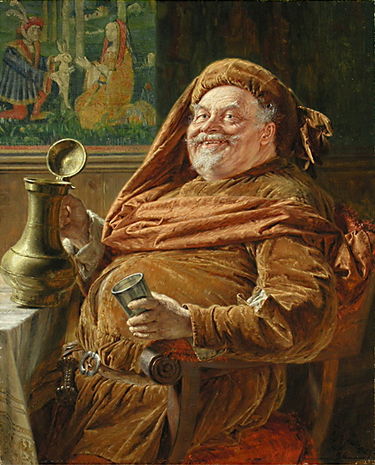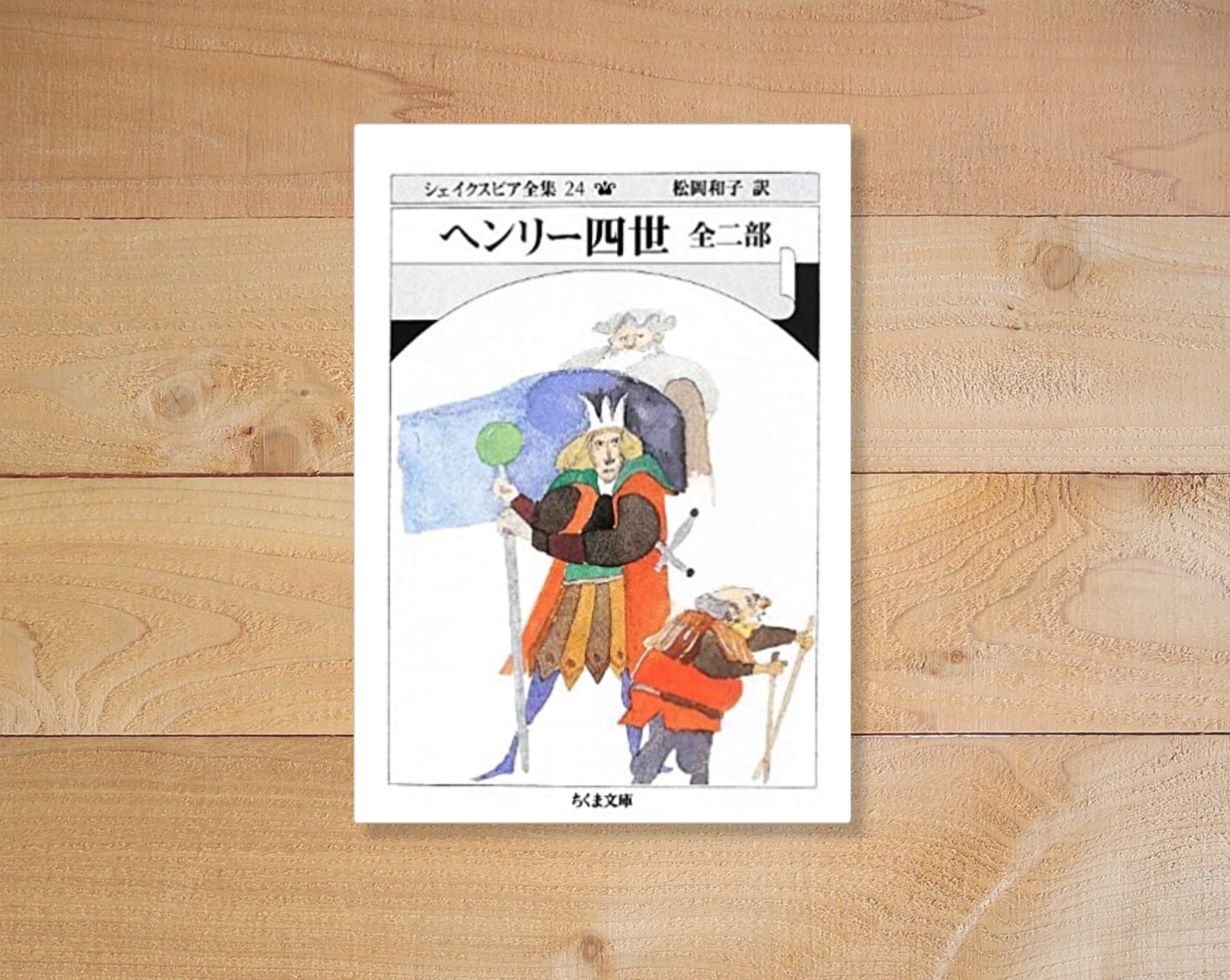Shakespeare's "Henry IV" Synopsis and Comments - Prince Hal and Forstaff, the historical drama that created a great character.
I would like to introduce Shakespeare's "Henry IV," which is believed to have been written between 1596 and 1998. I read it from Chikuma Shobo, translated by Kazuko Matsuoka.
Let's take a quick look at the book.
The reign of King Henry IV was consumed with rebellions and suppressions of the nobility. Meanwhile, the prodigal son, Prince Hal, who was a boozy, boastful knight and a playboy with Forstaff, took his father's advice to heart and defeated his old enemy, Hotspur, in a daring coup. After his father's death, Hal takes the throne as King Henry V with high expectations. This popular English historical drama features the lively dialogue between Hal and Forstaff.
AmazonProducts Page.
The highlight of this production is the famous characters, Prince Hal and Forstaff. Forstaff in particular is known as the most outstanding character created by Shakespeare.
The commentary at the end of the book describes this Forstaff as follows
Forstaff is sometimes said to be the pinnacle of characters created by Shakespeare. He may even surpass Hamlet and Shylock in the way he transcends the framework of his works to give the audience the warmth of a real person. There is even a legend that Queen Elizabeth, after seeing "Henley IV," was so taken with Forstaff that she ordered him to "make love to that man," and Shakespeare immediately wrote "The Merry Wives of Windsor.
Forstaffe is a bold and openhearted figure who epitomizes the free and vigorous vitality (élan vital) of the Renaissance. He has the power of Gargantua, Rabelais's drinking giant who was born shouting "I want to drink," and his drum belly is filled with the vulgar and obscene energy of Bruegel's painting, symbolizing the vibrant Renaissance era. The tradition of laughter that has been handed down since Boccaccio and Chaucer is brought to fruition in this man, who amuses everyone with his endless wit and endearingly cheerful irresponsibility. In the Kyogen play "Hourai Samurai," created by Yasuya Takahashi with Verdi's opera "Forstaffe" in mind, the line of Sukeemon Doda (Forstaffe), "In the garden of banquets, in first place; in the garden of war, bikketsu" most clearly symbolizes his personality.
Chikuma Shobo, Shakespeare, translated by Kazuko Matsuoka, Henry IV, p. 454-455

I knew of Forstaff even before I read "Henry IV". The name appears in a variety of venues, not only in Shakespeare-related books, but also in theater and literature.
I have always been curious about "who the hell is this so famous Forstaff," and finally got to read about his activities.
I was actually convinced after reading it that this is interesting. Indeed, Forstaff's presence is overwhelming.
Witty words fly like machine guns. Say this and say that. It is a series of great lines that make you chuckle.
And his ridiculous drum belly and heavy weight looks are also great. Prince Hal teases him about his looks many times, which is also very funny.
The setting of "Henry IV" was, period-wise, in the midst of the Anglo-French 100 Years War, and moreover, a time of fearful discontent and intrigue that accompanied Henry IV's accession to the throne. In fact, in this story, as the synopsis above shows, Prince Hal is fighting his nemesis Hotspur to put down a civil war.
Basically, the story has the air of a bloody war.
But in this atmosphere of war, the prodigal son (played by Prince Hal) and Forstaffe repeatedly exchange witty banter. Their witty exchanges, which dispel the heavy atmosphere of civil war, are nothing short of astonishing.
To begin with, the reign of Henry IV was an era of civil war and the suppression of rebellion. In other words, it was an era of instability in which it was impossible to know who was friend and who was foe. It was a time filled with lies, in which one never knew who would betray and change sides at any moment. You never know what lies behind sincere words.
So Prince Hal and Forstaff proudly lie to each other in such a situation. This is exhilarating. In a world full of lies, they are playing with lies with impunity. This lightheartedness is one of the charms of Prince Hal and Forstaff, isn't it?
Prince Hal's dialogue when he sees Forstaff's special move on the battlefield, pretending to be dead, is also excellent. Prince Hal does not see through Forstaff's deadly pretense and calls him out as dead.
In today's bloody battle, some of those whom death has vanquished
Chikuma Shobo, Shakespeare, translated by Kazuko Matsuoka, Henry IV, p. 208
There were many more important people than you, but none as heavyweight as you.
I laughed at this line, but shortly afterwards, when Prince Hal leaves to bury Forstaff, he stands up and says this famous line.
Damn it, I had no choice but to play dead earlier. If I hadn't done that, that Scottish ruffian would've knocked me down with a whimper and that would've been the end of the world. Pretend? No, I'm not pretending to be something I'm not. To die is to become something else in the first place. After all, a human being who has lost his life is only a fake of a human being. But when a human being pretends to be dead and lives as a result, it is not a fake. It's a real, perfect life. The best part of courage is judgment. I put that best part to work and saved my own life. Damn, I'm scared shitless of this fireball Percy, even though he's dead. What if he pretends to be dead, too, and then comes back up? I'm sorry to say, but when it comes to pretending to be dead, he's one step ahead of me. So, let's make sure he never comes back to life. And I'll claim that I killed him. This guy could get up just like me, right? Only an eyewitness can refute that. And there are no witnesses here. All right, how about this? (stabbing Hotspur) I got a new cut on my thigh, come on, come with me. (carrying Hotspur)
Chikuma Shobo, Shakespeare, translated by Kazuko Matsuoka, Henry IV, p209-210
Forstaff does not just fall down. He had come back from the dead, and had thus successfully taken the credit for Prince Hal's success. Hotspur was a leading rebel and a sworn enemy of Prince Hal. He had easily snatched away the enemy Prince Hal had worked so hard to defeat with his family's treasured sword of pretending to be dead. Prince Hal must have laughed at this.
I'm not a fake pretending to be something I'm not. To die in the first place is to become a fake. After all, a person who loses his life is only a fake of a person. But when a human being pretends to be dead and lives as a result, it is not a fake. It's a real, perfect life. The best part of courage is judgment. I put that best part to work and saved my own life."
This line is also appalling. Forstaff is not on the hero's side. He cheats and cheats. He has no courage, not even a trace of diligence. But I can't hate him! And why do we applaud this method of pretending to be dead? I want to cheer him on.
The commentary at the end of the book talked about this somehow unlikable Forstaff as follows.
In order for everyone to advocate Stoicism, which is about hard work, effort and perseverance, the hedonism (epicureanism) of Forstaff's "don't work hard, don't fight" is eliminated. Is that right? Of course, Forstaffe is not an Epicurean in the strict sense of the word, since Epicurus, the philosopher who advocated Epicureanism, does not condone a life of self-indulgence, seeks mental rather than physical pleasure, and preaches a Zen-like calmness of mind in search of what he perceives as "pleasure" in the mind.
Still, Forstaffe's quote, "Can honor heal a wound?" contains a profound truth, as does Romeo's line that asks, "Can philosophy make Juliet?
Stoicism can lead to war, but hedonism can never lead to war. The audience may be pained by Forstaff's expulsion because they feel in a corner of their hearts that Forstaff's hedonism also has something to learn from it.
Forstaff may be cowardly and cowardly. It is despicable for a warrior to imitate death on the battlefield or to wound a corpse. However, the standard of value that condemns it as despicable is the one that endorses war in the first place, and is different from the feelings of ordinary people who worry about the danger of being wounded in battle. What is honor? Forstaff is a representative of the common people (even though he is a knight).
Chikuma Shobo, Shakespeare, translated by Kazuko Matsuoka, Henry IV, p. 459-469
Some line breaks have been made.
Forstaffe's quote, "Can honor heal a wound?" contains a profound truth, as does Romeo's line that asks, "Can philosophy make Juliet?"
What is honor? Forstaff is a representative of the common people (even though he is a knight).
I see, then, that Forstaff is more than just an "interesting being"; he is also a deeply fascinating character. So there was such a meaning to Forstaff, the masterpiece created by Shakespeare, the master of human insight. It is precisely because he is a character with such depth that he has been loved throughout the ages.
While many works are relatively compact, "Henry IV" is a large work that combines Parts I and II. However, thanks to the light-hearted exchanges between Prince Hal and Forstaff, we were never bored at all. I would love to see their interaction in a live performance. I am sure it would be a lot of fun.
I was looking forward to reading this book to see what kind of man the famous Forstaff was, and he was as delightful as I had hoped. I highly recommend this work.
The above is "Shakespeare's "Henry IV" Synopsis and Comments - Prince Hal and Forstaff, the historical drama that created a great character.
Next Article.
Click here to read the previous article.
Related Articles







































